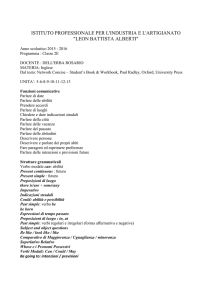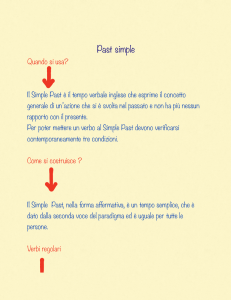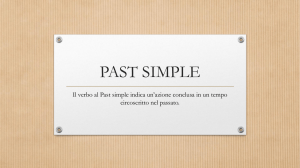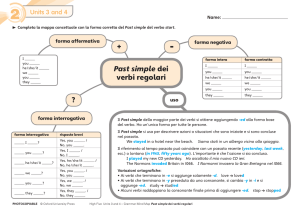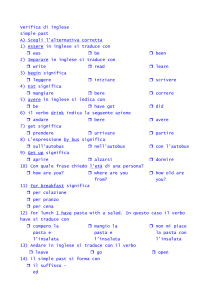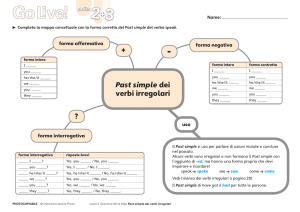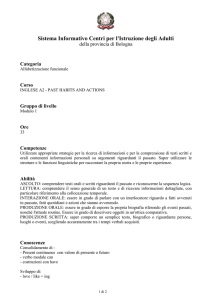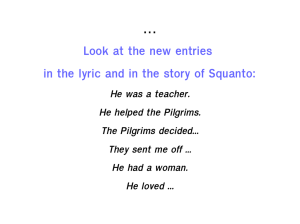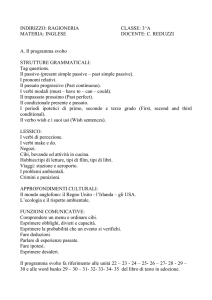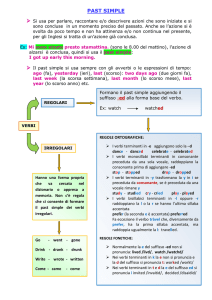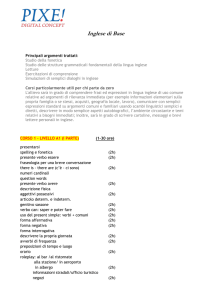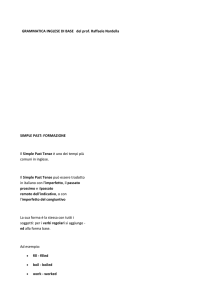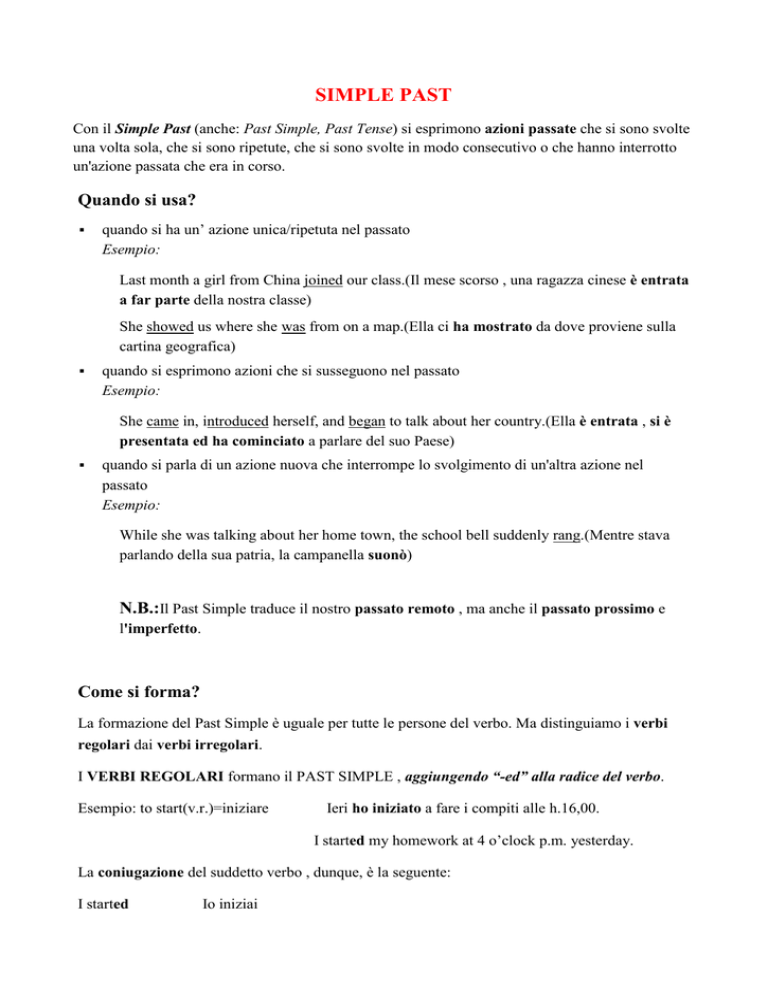
SIMPLE PAST
Con il Simple Past (anche: Past Simple, Past Tense) si esprimono azioni passate che si sono svolte
una volta sola, che si sono ripetute, che si sono svolte in modo consecutivo o che hanno interrotto
un'azione passata che era in corso.
Quando si usa?
quando si ha un’ azione unica/ripetuta nel passato
Esempio:
Last month a girl from China joined our class.(Il mese scorso , una ragazza cinese è entrata
a far parte della nostra classe)
She showed us where she was from on a map.(Ella ci ha mostrato da dove proviene sulla
cartina geografica)
quando si esprimono azioni che si susseguono nel passato
Esempio:
She came in, introduced herself, and began to talk about her country.(Ella è entrata , si è
presentata ed ha cominciato a parlare del suo Paese)
quando si parla di un azione nuova che interrompe lo svolgimento di un'altra azione nel
passato
Esempio:
While she was talking about her home town, the school bell suddenly rang.(Mentre stava
parlando della sua patria, la campanella suonò)
N.B.:Il Past Simple traduce il nostro passato remoto , ma anche il passato prossimo e
l'imperfetto.
Come si forma?
La formazione del Past Simple è uguale per tutte le persone del verbo. Ma distinguiamo i verbi
regolari dai verbi irregolari.
I VERBI REGOLARI formano il PAST SIMPLE , aggiungendo “-ed” alla radice del verbo.
Esempio: to start(v.r.)=iniziare
Ieri ho iniziato a fare i compiti alle h.16,00.
I started my homework at 4 o’clock p.m. yesterday.
La coniugazione del suddetto verbo , dunque, è la seguente:
I started
Io iniziai
You started
Tu iniziasti
He/she/it started
Egli/ella/esso iniziò
We started
Noi iniziammo
You started
Voi iniziaste
They started
Essi iniziarono
I VERBI IRREGOLARI , invece, sono elencati in un’apposita tabella, generalmente posta in
appendice ai dizionari monolingue e ai libri di testo. Essi formano il PAST SIMPLE , in maniera
irregolare , ossia cambiano forma a seconda del verbo. Pertanto devono essere memorizzati.
Esempio: to go(v.i.)=andare
Ieri sono andato a scuola alle h.7,30.
I went to school at half past seven a.m. yesterday.
La coniugazione del suddetto verbo , dunque, è la seguente:
I went
Io andai
You went
Tu andasti
He/she/it went
Egli/ella/esso andò
We went
Noi andammo
You went
Voi andaste
They went
Essi andarono
Nella formazione della frase negativa e delle domande in verbo rimane nella forma base e
soltanto il verbo ausiliare do si mette al passato (= did).Questo vale per tutte le persone del verbo.
Esempio:
Forma affermativa
Forma negativa
Forma interrogativa
verbi regolari
I started
I did not/ didn’t start
Did I start?
verbi irregolari
I went
I did not/ didn’t go
Did I go?
Particolarità nella formazione dei verbi regolari
quando un verbo finisce in -e, aggiungiamo soltando una -d.
Esempio:
to love – loved (non: loveed)
quando c’è una sola consonante finale , preceduta da una sola vocale corta e tonica si
raddoppia la consonante finale.
Esempio:
to admit– admitted
-l finale dopo vocale si raddoppia sempre nell'inglese britannico (ma non nell'inglese
americano).
Esempio:
to travel – travelled (inglese britannico), traveled (inglese americano)
-y a fine parola viene sostituita da-i., quando la “-y” è preceduta da consonante,ma resta
invariato , quando la “-y” è preceduta da vocale.
Esempi:
to hurry – hurried
to play- played
Il verbo to be(=essere)
Forma affermativa Forma negativa Forma interrogativa
I/he/she/it
I was
I was not
Was I?
you/we/they
you were
you were not
Were you?
Indicatori del passato:
yesterday, 2 minutes ago, in 1990, the other day, last Friday, etc.
Per approfondire l’argomento, visiona il video presente al seguente indirizzo:
http://youtu.be/ZWZ6cNq6bEY
http://youtu.be/XEfqj6J5cBQ
Esercizi:
1.Inserisci i verbi al Simple Past.
1. William (visit)
his grandparents last weekend.
2. Jane (arrive)
an hour ago.
3. We (go)
4. I (be)
to Bob's birthday party yesterday.
on holiday last week.
5. She (see)
fire.
2.Completa le frasi utilizzando la forma negativa.
1. I phoned Lucy last night. → I
Lucy last night.
2. You tidied up your room. → You
up your room.
3. Olivia became an actress. → Olivia
an actress.
4. We found the treasure. → We
the treasure.
5. He spoke Spanish. → He
Spanish.
3.Forma delle domande.
1. (you/dance)
2. (she/do)
at the party last night?
her homework?
3. (Robert/work)
4. (they/help)
at the post office?
you with the washing-up?
5. When (I/say)
that?
4.Put the verbs into the simple past:
1. Last year I (go)
2. It (be)
3. I (visit)
mine .
to England on holiday.
fantastic.
lots of interesting places. I (be)
4. In the mornings we (walk)
in the streets of London.
5. In the evenings we (go)
to pubs.
6. The weather (be)
strangely fine.
7. It (not / rain)
a lot.
8. But we (see)
some beautiful rainbows.
9. Where (spend / you)
your last holiday?
with two friends of
5.Write the past forms of the irregular verbs.
Infinitive
Simple Past
1.
meet
.
2.
drive
.
3.
speak
.
4.
put
.
5.
write
.
6.
sing
.
7.
do
.
8.
sit
.
9.
stand
.
10.
run
.
6.Put the sentences into simple past.
1. We move to a new house. →
2. They bring a sandwich. →
3. He doesn't do the homework. →
4. They sell cars. →
5. Does he visit his friends? →
7.Write sentences in simple past.
1. Janet / miss / the bus →
2. she / tidy / her room →
3. Nancy / watch / not / television→
4. she / read / a book →

